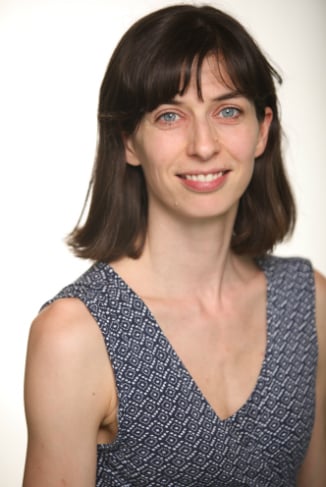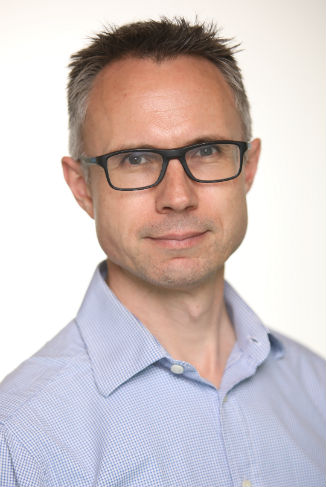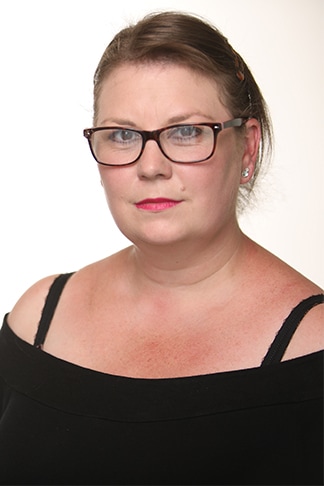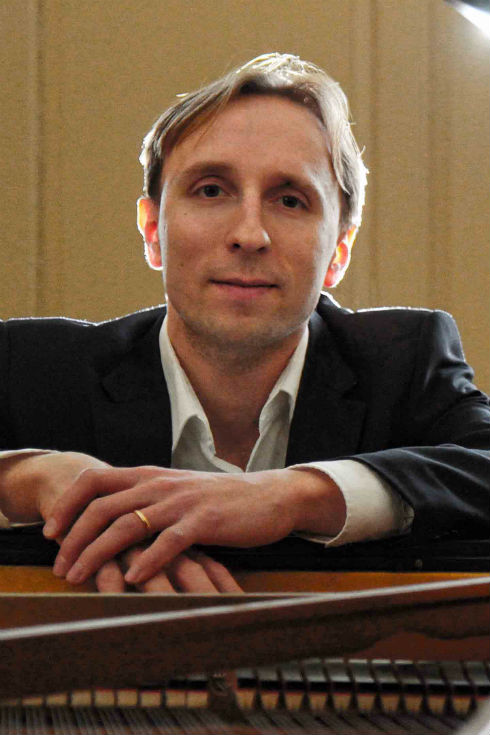Teaching Fellows and Senior Teaching Fellows at Trinity Laban have had the quality of their teaching recognised through a rigorous peer review process.
Through their teaching, they have shown they can integrate scholarship and professional practice to enhance teaching and curriculum development, utilise current pedagogic practices that are creative and adaptive, respond to the diverse needs of learners, and have made a significant and positive contribution to their department or area of responsibility.
Our Teaching Fellows and Senior Teaching Fellows have contributed creatively and positively to the learning and teaching culture of Trinity Laban. All additionally hold either FHEA or SFHEA.
Teaching Fellows
Teaching Fellows at Trinity Laban have made a significant contribution to the learning and teaching culture within the institution.
Melanie Clarke
Melanie Clark’s approach to teachingI have taught diverse groups of student for many years and, combined with my own experiences in dance, this has enabled me to develop a considerable toolkit of approaches to support learning. Whilst maintaining a coherency within each component, my delivery encompasses a variety of approaches and practices that support student motivation as well as allow them to explore dance principles and practices through a variety of lenses. I aim to support the transformational process of learning by actively empowering students by promoting the acquisition of agency and skills through a whole person approach in both teaching activities and curricular development. My pedagogical approach supports an embodied engagement through a somatic and thus, self-generating process. The somatic approach acknowledges the whole person within the learning journey including knowledge of themselves as an active, emotional, knowledgeable, self-actualising being which opens the possibility for a transformative process. Generating a space where students can learn through their own experiential process takes time to develop but means that their learning journey does not stop when a module or programme ends. Employing guided self-discovery alongside group process and dialogue acknowledges and promotes the learner as agent of their own learning process and focuses on engagement rather than ‘end-gaming’ or working towards assessment. I encourage an open enquiry through positive encouragement and individual support within a clear structure of delivery, clarity of communication regarding the purpose and learning outcomes of the particular process, and relevance to criteria of assessment and currency of skills. Supporting students’ feelings of safety within the unknowns of developmental processes is something I actively pursue. Creating a safe space where errors are permitted supports students’ confidence in trying new things in new ways. Being explicit about what we are exploring and why, at any one time, directs the students learning and allows them to acknowledge personal development in specific areas of practice. Generating an atmosphere of mutual respect and understanding through listening and supportive dialogue hopefully encourages and builds a collegiate atmosphere within the journey of an academic year.
|
Senior Teaching Fellows
Senior Teaching Fellows at Trinity Laban are of high standing within the wider learning and teaching community in Music and Dance and have demonstrated outstanding leadership of learning and teaching both within the institution and in external contexts.
Tim Palmer
Tim Palmer’s approach to teachingI have worked in a variety of professional roles, including performer, instrumental teacher, community musician and teacher trainer. Rather than developing a chameleonic stance my view is that these all feed into a single musician identity. The joy of working in a conservatoire, and at TL in particular, is that it is an environment where multiple takes on musicianship are celebrated and encouraged. Binding them together is a focus on musical excellence – whether that is facilitating excellent musical experiences in a nursery, a beginner instrumental lesson, a community choir or on the concert platform. In all these settings the power of music to make participants and audience wonder, imagine, laugh, think and reflect can be enabled by a focus on in-the-moment musical behaviour. This means that I try to train students to locate their musical instincts at the heart of their teaching practices. They have to be confident in their own musicianship and in the affective nature of any musical interaction – that then can lead to the facilitation of high quality learning environments. Learning is a complex behaviour, but it is clear that it is multi-modal – that we learn in many different ways simultaneously: knowledge and skills alongside habits, worldviews and behaviours, for example. By encouraging students to privilege non-verbal communication, and to be aware of the ‘teachable moment’ in music rather than about music they preserve the centrality of musical discourse to their practices, whether participatory or performance-oriented. There are many ways of demonstrating excellent musical behaviour, and not all require high levels of technical fluency. This means that music education programmes can open up the conservatoire to a broader and more diverse community, and the programmes that I lead host students from many countries and from multiple genre practices. This demonstrates to the conservatoire community a more democratic and open institutional model for the twenty-first century. There are many things that draw this community together, including a desire for reflective engagement in the relationship between practice and theory. However, a common theme in my teaching is a respect for playful creativity as the foundation of all music pedagogy and performance. Huizinga (1949) argues that all human culture is founded on play, and in my view our teaching and learning practices have lost sight of the idea that music is essentially an act of play. Whilst I don’t deny the work involved in becoming a musician or training a musician, our educational frameworks often inhibit the notion that we are learning to play better, and so a focus on autonomous, agentic, embodied, expressive and risk-taking practices in the lesson is encouraged, regardless of the forms of knowledge being worked on at any one time.
|
|
Victoria Stretton
Victoria Stretton’s approach to teachingIn order to work in education, you have to understand education. As a teacher and manager, it is not enough to just focus on your classroom teaching you also have to develop a broad understanding of the educational structures, expectations and pathways that our students have, and are engaging with. This not only assists in the design of programmes, but also informs how we manage and support students within the HE environment. This type of understanding is fundamental and crucial to my role. The delivery of education in the arts has always been of great interest to me, and as such, I have developed opportunities to work and support across a range of external settings, utilising my professional expertise in order to support and inform development and practices.
|
|
| Dr Aleksander Szram
Programme Leader: Certificate: The Practice of Music Making (CPMM), Foundation Certificate: Music, Foundation Certificate: Music & English Aleksander Szram’s approach to teaching‘One of the tasks of the progressive educator, through a serious, correct political analysis, is to unveil opportunities for hope, no matter what the obstacles may be. After all, without hope there is little we can do.’ So wrote the Brazilian educator Paulo Freire who has been a key influence on the formation of my teaching philosophy. Freire identified the tendency of institutions to see incoming students as empty vessels that needed to be filled with knowledge, and in the conservatoire environment this tendency can become a homogenising force that steers students towards an aesthetic centre-ground. In my opinion, this serves neither our students or our audiences – where is the hope for a student that graduates playing or singing the same repertoire in the same way as thousands of other graduates? How can audiences be excited by this? My experiences as a performing musician, a student and an educator across a broad range of international contexts has given me a firm conviction that the individuality of our students must be nurtured and encouraged. This conviction has been strengthened by the likely impact of machine-learning on the future role of the musician; that which is least ‘machine-like’, or least replicable, will be more treasured than ever before. My aspiration is that each graduating cohort of students will have the courage not to copy existing approaches, but to improve on what has gone before, shaping the world anew; if we are not to produce an endless supply of karaoke performers, mimicking the latest vogues, then we need to encourage our students to embrace both critical thinking and a curiosity to investigate the mentality of the creative act. To that end, my approach is characterised by problem-posing activities, teaching through discussion, and encouraging the development of future self-sufficiency (not establishing dependence on ‘more knowledgeable others’). There is so much to learn from other disciplines, and at Trinity Laban it is wonderful to have the opportunity to speak to colleagues in the Faculty of Dance and compare methods. The use of technology in arts training contexts is developing at a rapid pace, and it is inspiring to be working in an atmosphere where there is an openness to embrace new developments – not to replace what works well already, but to offer more flexible options to support a greater variety of students.’
|




